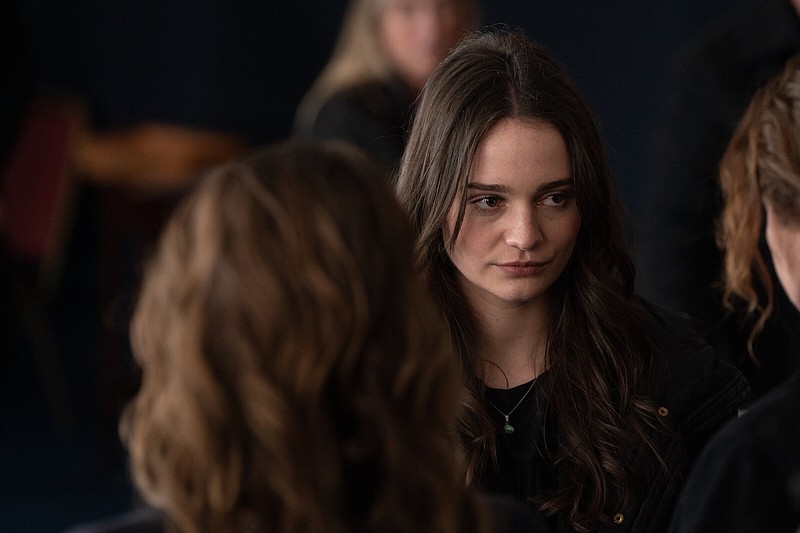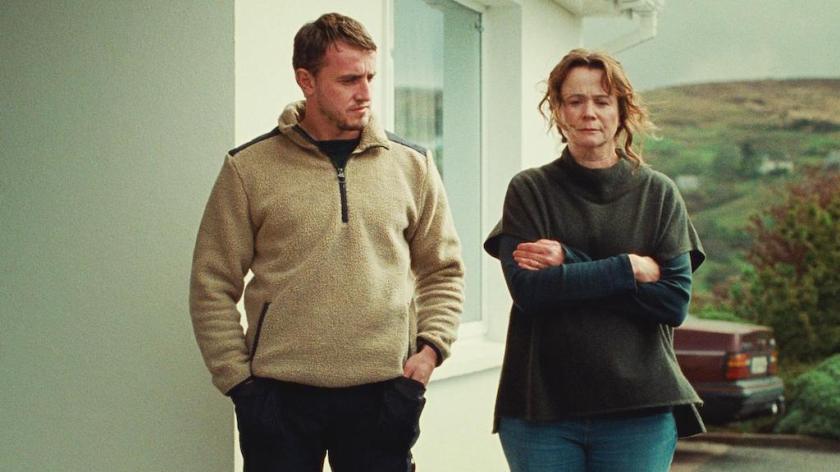There’s something about the Irish coastal village that makes filmmakers see it as a perfect locale for tales of human emotion in extremis, from David Lean’s Ryan’s Daughter to Martin McDonagh’s Banshees of Inisherin. Perhaps it’s the tension between political discontent, privation and the gorgeous landscape that unsettles people, makes them behave badly.
In the case of God’s Creatures, co-directed by Saela Davis and Anna Rose Holmer, you could even say it’s something in the water, literally: tides that can turn treacherous in seconds, making the work of the fishermen and oyster farmers particularly dangerous, and day-to-day life just that bit more grim.
The film sets its stall out immediately, with sound and image chillingly suggesting a drowning. A fisherman has been lost. The close community, with its tried and tested rituals, has a wake by the water’s edge, where Sarah Murphy (Aisling Franciosi, pictured below), the spiritual heart of the community, sings angelically. Back in the pub, the O’Hara women discuss the lack of swimming ability amongst the men, a conscious decision that avoids the dilemma of whether to risk one’s life to save a drowning pal. “It’s tradition”, says Aileen (Emma Watson), who works at the local fishery. Her daughter Erin (Toni O’Rourke), a single mother, sees it differently: ‘They’re a pack of selfish wankers.”
 That’s a convenient cue for the man who’s just walked through the door, Aileen’s son Brian (Paul Mescal), arriving out of the blue after years away from home. Watson’s face speaks more eloquently than a thousand words, moving swiftly from disbelief to quizzical delight to utter joy. Mescal’s Brian isn’t far behind: making his way through the crowd of men, matey and casual, his face transforms when he sees his mother, their embrace cementing the impression of the tightest of bonds between the two. The fact that Brian has been in Australia for years, without a word of contact, is quickly swept under the carpet. The prodigal son has returned, he says, to save the family’s oyster farm, which has been untended since his grandfather’s decline into dementia and his own departure; for his part, Brian’s father Con (Declan Conlon) has settled on some other, undisclosed employment and seems at a remove from the intense love-in of his wife and son.
That’s a convenient cue for the man who’s just walked through the door, Aileen’s son Brian (Paul Mescal), arriving out of the blue after years away from home. Watson’s face speaks more eloquently than a thousand words, moving swiftly from disbelief to quizzical delight to utter joy. Mescal’s Brian isn’t far behind: making his way through the crowd of men, matey and casual, his face transforms when he sees his mother, their embrace cementing the impression of the tightest of bonds between the two. The fact that Brian has been in Australia for years, without a word of contact, is quickly swept under the carpet. The prodigal son has returned, he says, to save the family’s oyster farm, which has been untended since his grandfather’s decline into dementia and his own departure; for his part, Brian’s father Con (Declan Conlon) has settled on some other, undisclosed employment and seems at a remove from the intense love-in of his wife and son.
Brian may be all charm and ease on the surface, but he’s clearly a troubled, dark soul, a renegade who quickly returns to his old side-line as a poacher. At sea, he’s the only one taking risks with the tide. When he’s not with Aileen, he seems increasingly solitary and morose. And then Sarah, his old flame, makes an accusation of rape. What’s almost as shocking, maternal instinct notwithstanding, is the lie that follows.
Aided by cinematographer Chayse Irwin’s moody visuals and an often percussive soundtrack loaded with foreboding, Davis and Holmer persuasively create a gloomy, doom-laden milieu, weighed down by ritual and regressive views. Within this setting, the central moral conundrum of Cronin O’Reilly’s script – a mother’s terrible choice between doing the right thing by her son, and another woman – is brilliantly portrayed by Watson, the dawning uncertainty and increasing conflict etching ever deeper into her features.
But while Watson and Mescal miraculously delineate the disintegration of familial love and trust, too much is omitted from the film as a whole: backstory and motivation for Brian, the presence of the father (Con is an inconsequential figure in the background) and, though we see the men in the community circle around Brian, the women’s response to the alleged rapist in their midst.
Ultimately, too, the resolution between mother and son is too dramatic to really hold water (even the preposterous actions of Greek tragedy follow more elucidated trajectories), while a sudden shift of perspective suddenly throws Watson’s extraordinary work to the wayside. And so a promising, and certainly intense scenario doesn’t quite fulfil its potential.















Add comment